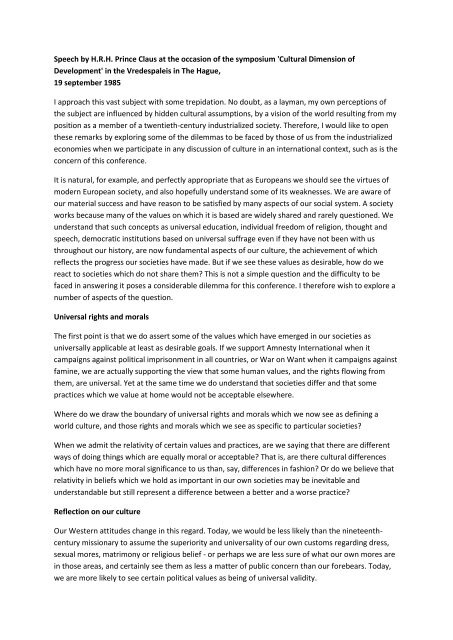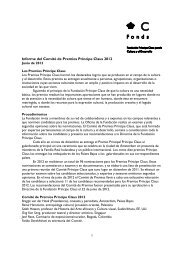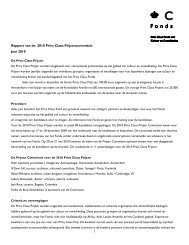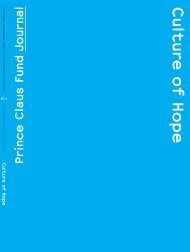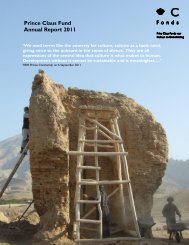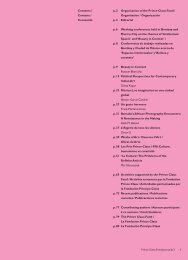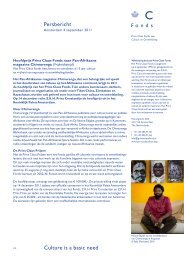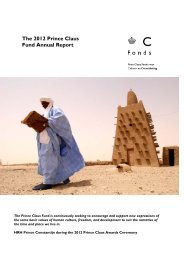Speech by H.R.H. Prince Claus at the occasion of the symposium ...
Speech by H.R.H. Prince Claus at the occasion of the symposium ...
Speech by H.R.H. Prince Claus at the occasion of the symposium ...
You also want an ePaper? Increase the reach of your titles
YUMPU automatically turns print PDFs into web optimized ePapers that Google loves.
Surely, <strong>the</strong> belief in <strong>the</strong> universality <strong>of</strong> certain human values and <strong>of</strong> <strong>the</strong> rights flowing from <strong>the</strong>m is apositive fe<strong>at</strong>ure <strong>of</strong> <strong>the</strong> postwar world - an assertion <strong>of</strong> human solidarity which has given rise tointern<strong>at</strong>ional development cooper<strong>at</strong>ion and to a sense <strong>of</strong> shared social and political responsibilitytranscending n<strong>at</strong>ional boundaries. At <strong>the</strong> same time, we have to be aware <strong>of</strong> how shadowy is <strong>the</strong>boundary between th<strong>at</strong> concern and p<strong>at</strong>ernalism, and we need to reflect on <strong>the</strong> degree to which ourown culture reflects our own circumstances, and, indeed, has changed as a result <strong>of</strong> our own historyand <strong>the</strong> evolution <strong>of</strong> <strong>the</strong> conditions <strong>of</strong> our society.The industrial countries are rich and powerful. We have also social achievements <strong>of</strong> which we shouldbe proud. However, even in our own histories we do not see a picture <strong>of</strong> universal progress. Withoutwishing to engage in social nostalgia or seeking to paint a false picture <strong>of</strong> a rosy past, we can all seeth<strong>at</strong> <strong>the</strong> m<strong>at</strong>erial and social achievements <strong>of</strong> our modern world have not been without costs in terms<strong>of</strong> alien<strong>at</strong>ion and <strong>the</strong> loss <strong>of</strong> desirable social characteristics <strong>of</strong> earlier times. Our own societies are notin all respects necessarily better than <strong>the</strong>y were one or two centuries ago, when admittedlyeconomic conditions were worse, and political and social institutions less developed. Likewise, ourown current m<strong>at</strong>erial superiority over <strong>the</strong> so-called Third World does not tell us th<strong>at</strong> our societies arein o<strong>the</strong>r respects superior. The complic<strong>at</strong>ed conclusion has to be th<strong>at</strong> <strong>the</strong>re are values which weclaim to be universal and <strong>by</strong> which we do judge cultures. Indeed, not to do so would be to deny <strong>the</strong>humanity <strong>of</strong> <strong>the</strong> members <strong>of</strong> <strong>the</strong> societies in question. But we must be cautious in so doing and notmake such judgements a vehicle for a sort <strong>of</strong> cultural imperialism through which we impose ono<strong>the</strong>rs our own peculiarities. We must also be ready to recognize <strong>the</strong> merit <strong>of</strong> quite different ways <strong>of</strong>behaviour.Inhabitants <strong>of</strong> an African village society, with <strong>the</strong> mutual oblig<strong>at</strong>ions <strong>of</strong> <strong>the</strong> extended family with anactive communal life and without <strong>the</strong> extreme division <strong>of</strong> labour <strong>of</strong> industrial society may sufferm<strong>at</strong>erial depriv<strong>at</strong>ion, but may also enjoy <strong>the</strong> merits <strong>of</strong> integr<strong>at</strong>ion into a lively and worthwhilecommunity.Opportunities and dangers <strong>of</strong> modern technologyThe impact <strong>of</strong> <strong>the</strong> industrial countries on <strong>the</strong> Third-World societies is not, however, primarily am<strong>at</strong>ter <strong>of</strong> conscious efforts to change or improve social institutions or implement cultural change.The most important cultural impact from <strong>the</strong> West comes about as <strong>the</strong> side-product <strong>of</strong> <strong>the</strong> economicand technical influences. Even within <strong>the</strong> West, technical change has been a potent source <strong>of</strong> socialand cultural transform<strong>at</strong>ion - we see th<strong>at</strong> today in effects ranging from <strong>the</strong> impact <strong>of</strong> moderninform<strong>at</strong>ion technology to <strong>the</strong> spread <strong>of</strong> fast food. Modern technology is a liber<strong>at</strong>ing force, increasingleisure, increasing <strong>the</strong> options open to <strong>the</strong> modern consumer, and a disruptive force, rendering oldways obsolescent and imposing on <strong>the</strong> individual and <strong>the</strong> small community <strong>the</strong> requirements <strong>of</strong> <strong>the</strong>mass society.Within <strong>the</strong> industrial societies, technical change can be seen as responding to our needs. Also, wehave some experience in handling technical change, even if we have not fully solved <strong>the</strong> problems <strong>of</strong>social disruption resulting from rapid innov<strong>at</strong>ion. However, it must be evident th<strong>at</strong> for developingsocieties, technical change poses even gre<strong>at</strong>er cultural and social problems. Transfer and acceptance<strong>of</strong> technology is never culturally neutral. Technical change comes from abroad, much <strong>of</strong> it geared to<strong>the</strong> contemporary needs <strong>of</strong> <strong>the</strong> industrialized countries.
The local capacity to control and modify imported technology is limited. Modern technology holdsout gre<strong>at</strong> hopes for Third-World development, but also real dangers. Let us consider some <strong>of</strong> <strong>the</strong>risks <strong>of</strong> technologically induced cultural change.One danger is th<strong>at</strong> external technology can mould <strong>the</strong> tastes and consumption habits <strong>of</strong> <strong>the</strong> Third-World consumer in a way which have unfortun<strong>at</strong>e consequences. We all know, for example, <strong>of</strong> <strong>the</strong>dangers associ<strong>at</strong>ed with <strong>the</strong> discouragement <strong>of</strong> breast-feeding.The availability <strong>of</strong> a Western life style, necessarily limited to <strong>the</strong> few, given <strong>the</strong> levels <strong>of</strong> n<strong>at</strong>ionalincome, can become a source <strong>of</strong> elitism and <strong>of</strong> misalloc<strong>at</strong>ion <strong>of</strong> a n<strong>at</strong>ion's resources. Westerntechnology can become a vehicle for <strong>the</strong> concentr<strong>at</strong>ion <strong>of</strong> resources on <strong>the</strong> s<strong>at</strong>isfaction <strong>of</strong> <strong>the</strong> needs<strong>of</strong> an urban minority who, in return, become alien<strong>at</strong>ed from <strong>the</strong> needs and <strong>the</strong> possibilities <strong>of</strong> <strong>the</strong>rural majority <strong>of</strong> <strong>the</strong>ir own societies.There have also been instances where <strong>the</strong> external intrusion has resulted in social change which hasundermined a complex balance between a society, its culture and its ecology.Building on traditional cultureI do not wish to imply <strong>by</strong> <strong>the</strong>se comments th<strong>at</strong> technical change is bad and th<strong>at</strong> brakes should be puton <strong>the</strong> transfer <strong>of</strong> technology. Far from it. Problems <strong>of</strong> poverty and hunger can only be solved <strong>by</strong> <strong>the</strong>applic<strong>at</strong>ion <strong>of</strong> technology. Moreover, cultural change is both necessary to gener<strong>at</strong>e development andits inevitable outcome. But we should be alert to <strong>the</strong> need to make technical change as relevant aspossible and <strong>of</strong> <strong>the</strong> need to limit <strong>the</strong> cultural and social costs involved.Wh<strong>at</strong> I have said in <strong>the</strong> preceding comments might seem as if I am focusing <strong>at</strong>tention exclusively on<strong>the</strong> cultural impact <strong>of</strong> technology and <strong>the</strong> purveyor <strong>of</strong> technology in <strong>the</strong> modern world, <strong>the</strong> business.This is <strong>by</strong> no means <strong>the</strong> case. Educ<strong>at</strong>ional institutions, planning practices and social welfaremeasures, which are evidently desirable in our own societies, can take on a quite different meaningwhen transferred to ano<strong>the</strong>r environment. The emphasis <strong>of</strong> social scientists a few years ago on <strong>the</strong>importance <strong>of</strong> wh<strong>at</strong> we call <strong>the</strong> 'informal sector' in developing countries suggested th<strong>at</strong> <strong>the</strong>re wasgre<strong>at</strong> value in th<strong>at</strong> sector <strong>of</strong> activity which lay outside <strong>the</strong> system <strong>of</strong> minimum wages, tax<strong>at</strong>ion,planning regul<strong>at</strong>ions, etc. Which represented wh<strong>at</strong> was best and possible in our own welfare systembut which could not be extended to <strong>the</strong> mass <strong>of</strong> <strong>the</strong> popul<strong>at</strong>ion in a poor country.We should also understand th<strong>at</strong> those countries which develop most effectively are likely to be thosewhich, like Japan, selected from Western technology wh<strong>at</strong> <strong>the</strong>y needed, modified <strong>the</strong>ir culture andsociety but never<strong>the</strong>less built upon <strong>the</strong>ir traditional culture and values, to develop a modernJapanese way <strong>of</strong> doing things which we now find worthwhile to study. Developing countries need toborrow from our technology and, no doubt, many <strong>of</strong> <strong>the</strong>ir political and economic institutions to drawfrom <strong>the</strong> Western experience. But also <strong>the</strong>y should draw on <strong>the</strong>ir own cultural strengths and adaptimported practices to <strong>the</strong>ir own social setting.N<strong>at</strong>ional identity and languageIn this regard, I suspect th<strong>at</strong> <strong>the</strong> cre<strong>at</strong>ion <strong>of</strong> wh<strong>at</strong> might be described as a clearly identified n<strong>at</strong>ionalculture, with a strong sense <strong>of</strong> n<strong>at</strong>ional identity may be as important a task as <strong>the</strong> pursuit <strong>of</strong> m<strong>at</strong>erialprogress in <strong>the</strong> early stages <strong>of</strong> n<strong>at</strong>ion building. Moreover, in <strong>the</strong> longer term <strong>the</strong> self-confidence andsolidarity resulting from a strong sense <strong>of</strong> n<strong>at</strong>ional identity may be <strong>of</strong> gre<strong>at</strong> value in tackling <strong>the</strong>difficult tasks <strong>of</strong> economic development. The building <strong>of</strong> n<strong>at</strong>ional culture is both a legitim<strong>at</strong>e goal <strong>of</strong>development and may even be a prerequisite for m<strong>at</strong>erial progress. Looking back, it may well be th<strong>at</strong>
<strong>the</strong> first gener<strong>at</strong>ion <strong>of</strong> n<strong>at</strong>ional leaders in <strong>the</strong> Third World will be judged as much <strong>by</strong> <strong>the</strong>irachievements in cre<strong>at</strong>ing a n<strong>at</strong>ional identity as <strong>the</strong>ir impact on <strong>the</strong> gross n<strong>at</strong>ional product.This leads me to a key aspect <strong>of</strong> n<strong>at</strong>ional culture to which, perhaps, this meeting should give some<strong>at</strong>tention: namely th<strong>at</strong> <strong>of</strong> language. Surely <strong>the</strong>re is gre<strong>at</strong> advantage gained from <strong>the</strong> existence <strong>of</strong> an<strong>at</strong>ional language shared <strong>by</strong> <strong>the</strong> elites and <strong>the</strong> masses. O<strong>the</strong>rwise, language itself can become asource <strong>of</strong> social division, increasing <strong>the</strong> gap not only between <strong>the</strong> educ<strong>at</strong>ed and uneduc<strong>at</strong>ed but alsobetween town and country.Where for example <strong>the</strong> elite's language is a foreign tongue, this not only makes <strong>the</strong> discourse <strong>of</strong> <strong>the</strong>elite inaccessible to <strong>the</strong> bulk <strong>of</strong> <strong>the</strong> popul<strong>at</strong>ion but may also make it more difficult for <strong>the</strong> elite torel<strong>at</strong>e to local problems. The world <strong>of</strong> learning becomes a foreign world conducted in a foreignlanguage and quite remote from <strong>the</strong> world <strong>of</strong> <strong>the</strong> countryside and <strong>the</strong> ordinary folk.It is this point th<strong>at</strong> leads me to suspect th<strong>at</strong> one <strong>of</strong> president Nyerere's most considerableachievements has been <strong>the</strong> promotion <strong>of</strong> Swahili as a n<strong>at</strong>ional language for Tanzania. In th<strong>at</strong> case, <strong>of</strong>course, conditions were favourable for such a development. Th<strong>at</strong> is not always <strong>the</strong> case.For <strong>of</strong> course, <strong>the</strong> language issue is not a simple one. In a number <strong>of</strong> countries, <strong>the</strong> colonial mo<strong>the</strong>rtongue provided <strong>the</strong> only n<strong>at</strong>ional lingua franca, across regional or tribal boundaries. The <strong>at</strong>tempt topromote a n<strong>at</strong>ional language more readily accessible to some linguistic groups than o<strong>the</strong>rs has itselfbecome a source <strong>of</strong> division in a number <strong>of</strong> countries.Moreover, to build a language into an instrument <strong>of</strong> modern technology, bureaucracy andscholarship is a major task. There is also a loss involved if <strong>the</strong> promotion <strong>of</strong> a n<strong>at</strong>ional language leadsto a decline in <strong>the</strong> elite's command over foreign languages - a loss in terms <strong>of</strong> intern<strong>at</strong>ionalintellectual access and also, possibly, regional communic<strong>at</strong>ion. However, while in Africa access toFrench, English, Portuguese or Arabic allows for ready communic<strong>at</strong>ion among <strong>the</strong> st<strong>at</strong>es whose elitesshare command over those languages, it also defines lines <strong>of</strong> cultural division within <strong>the</strong> continentreflecting <strong>the</strong> colonial past r<strong>at</strong>her than present or future needs.It is important to recognize th<strong>at</strong> a corollary to <strong>the</strong> development <strong>of</strong> a n<strong>at</strong>ional language must be <strong>the</strong>production <strong>of</strong> a large flow <strong>of</strong> published m<strong>at</strong>erial in <strong>the</strong> language. Here I would sound a note <strong>of</strong> alarm.One result <strong>of</strong> economic crises has been th<strong>at</strong> in many countries <strong>the</strong> flow <strong>of</strong> written m<strong>at</strong>erial in anylanguage has dried up, not to speak <strong>of</strong> <strong>the</strong> supply <strong>of</strong> m<strong>at</strong>erials in languages widely accessible to <strong>the</strong>mass <strong>of</strong> <strong>the</strong> liter<strong>at</strong>e popul<strong>at</strong>ion. In Africa we have <strong>the</strong> sad spectacle <strong>of</strong> a widespread increase inliteracy being m<strong>at</strong>ched <strong>by</strong> a widespread decline in <strong>the</strong> availability <strong>of</strong> liter<strong>at</strong>ure. No doubt much <strong>of</strong>your discussion will be on complex issues, but we should also turn our <strong>at</strong>tention to <strong>the</strong> r<strong>at</strong>herpractical and straightforward need to ensure th<strong>at</strong> <strong>the</strong> physical means <strong>of</strong> communic<strong>at</strong>ion are availableto support cultural development and contact. There are no doubt many meanings to be placed onculture and development, as <strong>the</strong> discussions <strong>at</strong> <strong>the</strong> prepar<strong>at</strong>ory meeting for this conferenceindic<strong>at</strong>ed, but surely one minimal component <strong>of</strong> cultural development must be <strong>the</strong> availability <strong>of</strong>books for <strong>the</strong> mass <strong>of</strong> potential readers and access to means <strong>of</strong> public<strong>at</strong>ion for local writers.Challenges <strong>of</strong> culture and developmentAt <strong>the</strong> conclusion <strong>of</strong> <strong>the</strong>se few remarks, I would like to return to <strong>the</strong> question <strong>of</strong> how those <strong>of</strong> usfrom <strong>the</strong> so-called developed countries approach <strong>the</strong> problems <strong>of</strong> culture and development. Thereare a number <strong>of</strong> challenges presented to <strong>the</strong> Western intellectual, businessman or aid administr<strong>at</strong>or
working with Third-World countries. There is a need for self-awareness as to whe<strong>the</strong>r our own<strong>at</strong>titudes about wh<strong>at</strong> is right and proper are necessarily relevant in a developing economy andindeed society. We have to ask whe<strong>the</strong>r our products or technology, which we know are useful in ourown societies, also make a positive contribution in <strong>the</strong> developing country context, we also have tounderstand <strong>the</strong> setting in which our contacts, customers, workers, government <strong>of</strong>ficials are having tocome to terms with <strong>the</strong> process <strong>of</strong> cultural change.Often we expect <strong>the</strong> movement from behaviour relevant to rural peasant societies to urban life tohappen in one or two decades when in our own societies <strong>the</strong>se changes took centuries. Some alsoexpect such change to result in <strong>the</strong> same outcome <strong>the</strong>re as here.Many in <strong>the</strong> West have been sensitive to <strong>the</strong> virtues and values in foreign cultures. Indeed it issometimes <strong>the</strong> outsider who sees wh<strong>at</strong> is worth preserving in <strong>the</strong> local art or architecture before<strong>the</strong>re is an indigenous awareness <strong>of</strong> wh<strong>at</strong> is being lost in th<strong>at</strong> rush to change <strong>of</strong> which we are <strong>of</strong>ten<strong>the</strong> agents. We should support efforts to record and preserve those aspects <strong>of</strong> traditional culturewhich will enrich <strong>the</strong> futures <strong>of</strong> <strong>the</strong> developing countries, as part <strong>of</strong> <strong>the</strong>ir n<strong>at</strong>ional heritage, andenrich us as part <strong>of</strong> <strong>the</strong> heritage <strong>of</strong> mankind. Even if we adapt technology to need and minimize <strong>the</strong>unnecessary destruction <strong>of</strong> cultures, a fast pace <strong>of</strong> cultural change is certain, artistic perceptions willbe transformed, old skills will decline and p<strong>at</strong>terns <strong>of</strong> living will be modified. Such change isinevitable. We cannot expect <strong>the</strong> people <strong>of</strong> developing countries to live in museums or preservecultures in a sort <strong>of</strong> human zoo. But we can make a sustained effort to ensure th<strong>at</strong> as cultures changeand <strong>the</strong> daily round <strong>of</strong> existence and human beliefs adjust to <strong>the</strong> needs <strong>of</strong> modern living, <strong>the</strong>achievements <strong>of</strong> previous gener<strong>at</strong>ions are not lost. Not only th<strong>at</strong> but our vision <strong>of</strong> our own societyand art is enriched <strong>by</strong> an understanding <strong>of</strong> <strong>the</strong> past and <strong>of</strong> <strong>the</strong> diversity <strong>of</strong> contemporary humanexperience.This should not be <strong>the</strong> esoteric preserve <strong>of</strong> <strong>the</strong> specialist, but should be encouraged as a much widerresponsibility - and opportunity. Modern Communic<strong>at</strong>ions have brought <strong>the</strong> peoples <strong>of</strong> <strong>the</strong> worldcloser toge<strong>the</strong>r - television and tourism, for example, have meant th<strong>at</strong> vast numbers <strong>of</strong> Europeanscan now be exposed to conditions in far countries which, just a few years ago, would have been <strong>at</strong>most presented on <strong>the</strong> written page. This has cre<strong>at</strong>ed an enormous opportunity for understanding -and misunderstanding. It is interesting th<strong>at</strong> in Europe, tourism had its origins as much in <strong>the</strong> pursuit<strong>of</strong> educ<strong>at</strong>ion as leisure. Too <strong>of</strong>ten tourism is now a m<strong>at</strong>ter <strong>of</strong> sunshine in <strong>the</strong> day and night-clubs in<strong>the</strong> evenings with exposure to local 'culture' taking <strong>the</strong> form <strong>of</strong> <strong>the</strong> present<strong>at</strong>ion <strong>of</strong> a debased version<strong>of</strong> local arts, crafts and foods to meet <strong>the</strong> visitors' preconception <strong>of</strong> <strong>the</strong> quaint and <strong>the</strong> exotic.Tourism is going to be an increasing form <strong>of</strong> human contact. Quite rightly, voices have been raised incriticism where tourism has been <strong>the</strong> source <strong>of</strong> cultural debasement - a sort <strong>of</strong> pollution throughhuman contact. But surely it should be possible to influence such contacts so th<strong>at</strong> <strong>the</strong>y are not only asource <strong>of</strong> subversion <strong>of</strong> local morals and taste (as illustr<strong>at</strong>ed <strong>by</strong> <strong>the</strong> term 'airport art'), but couldbecome a source <strong>of</strong> increasing mutual understanding and respect between cultures.Ladies and gentlemen,I have taken this opportunity you have given me to raise a few questions rel<strong>at</strong>ed to your <strong>the</strong>mewhich have occurred to me. I have no doubt th<strong>at</strong> in <strong>the</strong> coming discussions <strong>the</strong>re will be many morestimul<strong>at</strong>ing issues raised. I look forward to reading a full report on <strong>the</strong> meeting with <strong>the</strong> expect<strong>at</strong>ionth<strong>at</strong> <strong>the</strong> proceedings will be lively and illumin<strong>at</strong>ing, and will eventually lead to some practical results.
____________________This speech was published in Cultuur en Ontwikkeling, toepsraken en opstellen over cultuur enontwikkeling van Z.K.H. Prins <strong>Claus</strong> der Nederlanden© Directie Voorlichting Ontwikkelingssamenwerking van het Ministerie van Buitenlandse Zaken, TheHague 1996.


